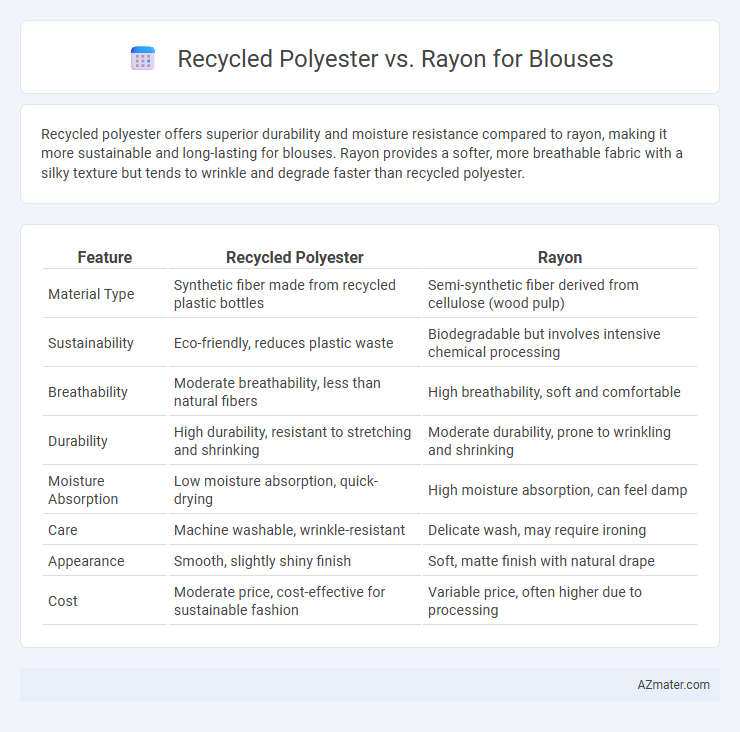Recycled polyester offers superior durability and moisture resistance compared to rayon, making it more sustainable and long-lasting for blouses. Rayon provides a softer, more breathable fabric with a silky texture but tends to wrinkle and degrade faster than recycled polyester.
Table of Comparison
| Feature | Recycled Polyester | Rayon |
|---|---|---|
| Material Type | Synthetic fiber made from recycled plastic bottles | Semi-synthetic fiber derived from cellulose (wood pulp) |
| Sustainability | Eco-friendly, reduces plastic waste | Biodegradable but involves intensive chemical processing |
| Breathability | Moderate breathability, less than natural fibers | High breathability, soft and comfortable |
| Durability | High durability, resistant to stretching and shrinking | Moderate durability, prone to wrinkling and shrinking |
| Moisture Absorption | Low moisture absorption, quick-drying | High moisture absorption, can feel damp |
| Care | Machine washable, wrinkle-resistant | Delicate wash, may require ironing |
| Appearance | Smooth, slightly shiny finish | Soft, matte finish with natural drape |
| Cost | Moderate price, cost-effective for sustainable fashion | Variable price, often higher due to processing |
Introduction to Recycled Polyester and Rayon
Recycled polyester is manufactured from post-consumer plastic bottles, offering a sustainable alternative that reduces landfill waste and conserves resources. Rayon, a semi-synthetic fiber made from regenerated cellulose typically sourced from wood pulp, provides a soft and breathable texture ideal for blouses. Choosing between recycled polyester and rayon involves balancing eco-friendly benefits with fabric comfort and durability.
Fabric Origins: How Recycled Polyester and Rayon Are Made
Recycled polyester is produced by melting down and reprocessing post-consumer plastic bottles or industrial polyester waste, significantly reducing landfill contributions and reliance on virgin petroleum resources. Rayon originates from natural cellulose fibers derived from wood pulp, which undergoes a chemical process involving solvents and regeneration to create a semi-synthetic fabric resembling natural fibers. Both fabrics offer distinct environmental impacts tied to their production methods, with recycled polyester emphasizing waste reduction and rayon relying on renewable plant-based materials.
Environmental Impact Comparison
Recycled polyester blouse production significantly reduces plastic waste by repurposing PET bottles, lowering greenhouse gas emissions by up to 75% compared to virgin polyester, and requiring less water than conventional textile manufacturing. Rayon, derived from cellulose fibers like wood pulp, involves intensive chemical processing and deforestation, leading to habitat loss, high water consumption, and toxic effluent discharge that threaten aquatic ecosystems. Choosing recycled polyester over rayon for blouses minimizes environmental impact through resource conservation, reduced pollution, and a lower carbon footprint in the fashion industry.
Comfort and Feel: Recycled Polyester vs. Rayon
Recycled polyester offers moisture-wicking properties and durability, making blouses comfortable for long wear in varied conditions. Rayon provides a soft, breathable feel with a smooth texture that resembles natural fibers, enhancing comfort in warm climates. While recycled polyester resists wrinkles and retains shape, rayon excels in drape and softness, influencing the blouse's overall tactile experience.
Durability and Care Differences
Recycled polyester offers superior durability for blouses, resisting wrinkles, shrinking, and stretching, while rayon tends to be more delicate and prone to damage from washing and heat. Care for recycled polyester involves simple machine washing and low-heat drying, whereas rayon often requires hand washing or dry cleaning to maintain fabric integrity. Choosing recycled polyester enhances longevity and ease of maintenance, whereas rayon provides softness but demands more meticulous care.
Moisture-Wicking and Breathability
Recycled polyester features superior moisture-wicking properties, effectively drawing sweat away from the skin to keep the wearer dry during extended use. Rayon, derived from natural cellulose fibers, offers excellent breathability, enhancing air circulation to maintain comfort in warm conditions. For blouses, combining recycled polyester's moisture management with rayon's ventilation creates an optimal balance for active and casual wear.
Cost and Affordability Analysis
Recycled polyester generally offers a more cost-effective option for blouses compared to rayon, as it is derived from plastic waste such as PET bottles, reducing raw material expenses and promoting sustainability. Rayon, while often softer and more breathable, tends to have higher production costs due to its semi-synthetic nature derived from cellulose fiber, impacting overall affordability. Manufacturers choosing between recycled polyester and rayon must weigh durability and budget constraints, with recycled polyester providing a lower-cost alternative without compromising on environmental benefits.
Style and Versatility for Blouse Design
Recycled polyester offers durability and vibrant color retention, making it ideal for blouses that require long-lasting style and easy maintenance. Rayon provides a soft, breathable texture with excellent drape, lending a flowy, elegant look perfect for dressier blouse designs. Both fabrics enhance versatility, but recycled polyester suits casual, activewear-inspired blouses while rayon excels in sophisticated, office-appropriate styles.
Potential Allergies and Skin Sensitivity
Recycled polyester is less likely to cause allergic reactions or skin irritation due to its synthetic origin and moisture-wicking properties, making it suitable for sensitive skin. Rayon, derived from natural cellulose fibers, can be softer and more breathable but may sometimes cause irritation for individuals with sensitive skin or allergies triggered by residual chemicals from the manufacturing process. Choosing between these fabrics should consider personal sensitivity, with recycled polyester offering hypoallergenic advantages and rayon providing comfort with potential allergen concerns.
Which Fabric is Right for Your Blouse?
Recycled polyester offers durability, moisture-wicking properties, and eco-friendly benefits, making it ideal for blouses that require long-lasting wear and easy maintenance. Rayon, known for its softness, breathability, and luxurious drape, suits blouses seeking a lightweight, comfortable feel with a smooth finish. Choosing between recycled polyester and rayon depends on your preference for sustainability and performance versus natural fiber comfort and elegance in your blouse.

Infographic: Recycled polyester vs Rayon for Blouse
 azmater.com
azmater.com